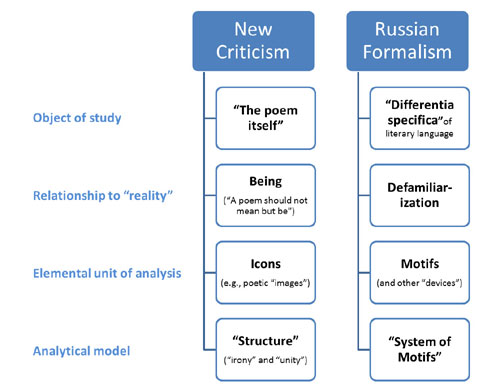-
If you are citizen of an European Union member nation, you may not use this service unless you are at least 16 years old.
-
You already know Dokkio is an AI-powered assistant to organize & manage your digital files & messages. Very soon, Dokkio will support Outlook as well as One Drive. Check it out today!
| |
Class 7 Notes
Page history
last edited
by Alan Liu 10 years, 3 months ago
Preliminary Class Business
Origins and Cultural Context of New Criticism
(continued from last class)
Russian Formalism
Readings from Russian Formalism:
(in required book: Lemon & Reis, ed., Russian Formalist Criticism)
- Victor Shklovsky, "Art as Technique" (1917)
- Boris Eichenbaum, "The Theory of the 'Formal Method'" (1926)
- Boris Tomashevsky, from "Thematics" (1925): read only pp. 66-87, 92-95
- Resources for Study of Russian Formalism (see below)
1. The "Voice" of Russian Formalism
2. Development of Russian Formalism
(For resources on Russian Formalism see below)
- Turn of the Century Russian Literary Milieu:
- Analogous to Belle Lettres in West:
- Russian Symbolists (Vladimir Solovev, Aleksandr Blok, Andrei Belyi, etc.)
- Alexander Potebnya (psychologization of Symbolism: poetry is thinking in images)
- Analogous to Historical Criticism:
- Academic scholarship: sociological and biographical on the model of Taine and German Kultur- and Geistesgeschicte
- Journalistic criticism
- Avant-garde or New Movements:
- Futurism (e.g., Vladimir Mayakovsky)
- Linguistics
- Emergence: 1915-20
- 1915: Moscow Linguistic Circle (Roman Jakobson, Boris Tomashevsky, Vladimir Mayakovsky)
- 1916: Petersburg Society for the Study of Poetic Language, or OPOJAZ (linguists: Leo Jakubinsky; literary theorists: Victor Shlovsky, Boris Eichenbaum)
- Sborniki journal (Studies in the Theory of Poetic Language)
- 1920: "Division of Literary History" at the Petrograd State Institute of Art History (Eichenbaum, Shlovsky, Jurij Tynjanov, Tomashevski)
- Triumph and Diversification: 1921-25
- Attack and Defeat: 1925-30 (see Victor Erlich, Russian Formalism: History–Doctrine, chapters 6-7)
- 1924-25: opening of the Marxist offensive on formalism
- Leon Trotsky's Literature and the Revolution (with a chapter on "The Formalist School") (1924)
- Article by Anatoly Lunacharsky, first Soviet Commissar of Education in the Press and Revolution journal (1924)
- 1926-28: period of accommodation to Marxism
- Shklovsky, The Third Factory (1926); Materials and Style in Tolstoy's War and Peace (1928)
- Eichenbaum: "Literature and Literary Mores" (1927)
- 1928-32: First Five-Year Plan
- RAPP, Russian Assoc. of Proletarian Writers, given the task of regulating literary theory
- 1930 and following
- Shklovsky, "A Monument to a Scientific Error" (1930)
- New Developments
- The "Prague School": Prague Linguistic Circle (1926)
- "Neo-Structuralists" (e.g., Jurij Lotman, Boris Uspenskij)
3. Principles of Russian Formalism

Resources for Study of Russian Formalism
- Some Russian Formalist writings in English (other than in the Lemon & Reis volume)
- Ladislav Matejka and Krystyna Pomorska, ed., Readings in Russian Poetics: Formalist and Structuralist Views (Cambridge, Mass.: MIT Press 1971)
- About Russian Formalism
- Victor Erlich, Russian Formalism: History--Doctrine, 3d ed. (New Haven: Yale University Press, 1981)
- Peter Steiner, Russian Formalism: A Metapoetics (Ithaca, NY: Cornell University Press, 1984)
- Ewa M. Thompson, Russian Formalism and Anglo-American New Criticism: A Comparative Study (The Hague: Mouton, 1971)
- Tony Bennett, Formalism and Marxism, New Accents (London: Methuen, 1979)
- Some Prague School essays in English
- Ladislav Matejka and Irwin R. Titunik, ed., Semiotics of Art: Prague School Contributions (Cambridge, Mass.: MIT Press, 1976)
- Peter Steiner, The Prague School: Selected Writings, 1929-1946 (Austin: University of Texas Press, 1982)
- On the Prague School
- F. W. Galan, Historic Structures: The Prague School Project, 1928-1946 (Austin University of Texas Press, 1985)
- Some "Neo-Structuralist" works in English
- Daniel P. Lucid, ed. and trans., Soviet Semiotics: An Anthology (Baltimore: Johns Hopkins University Press, 1977)
- Alexander D. Nakhimovsky and Alice Stone Nakhimovsky, The Semiotics of Russian Cultural History: Essays by Iurii M. Lotman, Lidiia Ia. Ginsburg, Boris A. Uspenskii (Ithaca, N.Y.: Cornell University Press, 1985)
Class 7 Notes
|
|
Tip: To turn text into a link, highlight the text, then click on a page or file from the list above.
|
|
|
|
|
Comments (0)
You don't have permission to comment on this page.